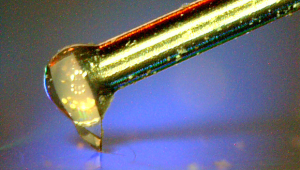DMM or Lacquer? Which is Better?
DMM is alive and well at GZ in the Czech Republic. They pressed both of the recent Rolling Stones box sets, one for ABKCO (the Decca era) and one for UMG (Rolling Stones Records and beyond). Both of these box sets were beautifully pressed too. You can find the review by searching this website.
However, while DMM (Direct Metal Mastering)— co-developed by Teldec and Neumann— was popular during the 1980s, it seems to have fallen out of favor in most mastering houses, with lacquer cutting preferred over copper. Europadisk, one of the last DMM facilities in the U.S. closed down in 2005.
Abbey Road had or perhaps still has a DMM cutting system but they too switched over to lacquer. Interestingly, a former Warner Brothers executive sent me both lacquer and DMM sourced pressings of a Wilco album and asked for my opinion about the sound quality.
It was hardly painful listening to Wilco! The two cuts sounded very different. The DMM was more precise, with sharper transients and better image "edge definition," while the lacquer cut was smoother, warmer and more pleasing on the ears.
Which was more "accurate"? There are many technical reasons why DMM is, but I won't bother going into them here, but given that Abbey Road and so many others have gone back to lacquer, it's clear that most current vinyl producers prefer lacquer.
One organization is very much into DMM and that would be The Church of Scientology. It has bought up every DMM lathe it can find and uses them to transfer founder L. Ron Hubbard's speeches to DMM metal discs, which are then plated and sealed with a pop top kind of mechanism that they developed. The plating is done at a major American pressing plant in a room devoted exclusively to the Church's work.
The plated and sealed discs are then transported and stored in a bunker said to be in the Mojave Desert, along with specially developed solar powered turntables fitted with phono cartridges that don't use rubber dampers for their suspensions. That way they won't deteriorate over time.
Way into the future when all of digital data has disappeared of is no longer playable, some future civilization will find the bunker and figure out how to play these discs. They will conclude that L. Ron Hubbard must have been the most important person in our civilization since only he was accorded such special treatment (kind of like the Pharaohs).
Does this sound far-fetched? Or like science-fiction? Maybe. But I assure you it's all true!









































